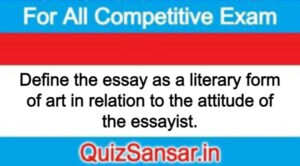
Define the essay as a literary form of art in relation to the attitude of the essayist.
Define the essay as a literary form of art in relation to the attitude of the essayist.
Or
The essay is an interesting piece of writing to give adequate delight to all the readers. Discuss it.
Or
Montaigne, the French essayist is regarded as the father of the essay. Discuss it.
Or
Explain that the essay had come to England from France in different forms. Discuss it.
Or
The essayist is both a spectator and interpreter of life. Discuss it.
Ans.
Introduction
According to the writer the essay in literature is like an organ among the element and it is difficult to define it, yet its rough definition is that, “It is a little piece with a theme not very strict perhaps in form but which can be fancifully treated, modulated and coloured at will. It is a little criticism of life at some point clearly enough defined. With this definition it is clear that the essay gives a poet’s vision of life, written in prose with a tinge of imagination. It is not a philosophical article loaded with intellectual reasoning or a brochure full of descriptive information.”
The essay is an interesting piece of writing
It is very necessary to mention that the essay is an interesting piece of writing which deals the subject related to human life without any teaching or without condemning it. The essayist includes his own impressions of life in his essay. He does not give any moral teaching to his readers, nor he condemns any weaknesses in it. His main purpose in writing his essay is that his readers should love life without feeling disappointed. He describes human life in an interesting manner like a painter that his readers take much interest in his essay. It should be noted by them that the essayist is an interpreter of life, not a critic of life. On the other hand he does not look at life like the historian, or like the philosopher, or like a novelist, nor as a poet but he describes life making a mixture of different elements of all of them.
The subject-matter is not important for the essay
It is necessary to mention that the subject-matter is not important for the essay because any subject will do to describe the thoughts of the essayist which should be clearly understood and enjoyed by the readers. The writer should express his thought in a beautiful manner with necessary gusto. The essay may be called the reverie, the frame of mind when a man says in the words of an old song. “Says I to myself, say 1.” In other words the essay is like a lyric in prose wherein the essayist expresses his real ideas in an artistic manner.
Montaigne the French writer as the father of the modern essay
It should be noted that Montaigne the French writer is the father of the modern essay. The charm of his essays may be found in his personality showing his virtues of frankness, gusto, sharp observation, good knowledge of men and their manners. Only a true essayist has all these virtues which were the part and parcel of Montaigne.
It is very necessary to describe that he should be ashamed of writing nothing which does not interest him, he should look at life closely and frankly and he should share his expressions with his readers more and more. It may be regarded against the common English temperament which is introvert by his nature. The castle of an English man is his home and he does not like to permit other persons to enter his home and mix up with them. If he wants to be an ideal essayist he should change his attitude and for this he should permit his visitors to enter his house freely as his good friends.
The essay came to England from France
It should be noted by the readers of this essay and common people that the essay came to England from France and it took different forms under the writings of different English writers. For example, Sir Thomas Browne had written his essays in an elaborate rhetorical style. Joseph Addison had written his essays in a new way for having emotional sentiments having fine relationship. Charles Lamb had written his essays with dignity and beauty of human life showing the simple and common experiences of life with the elements of rich emotions and humour. D. E. Quincey had written his essays in an autobiographical style. Walter Pater had written his essays with artistic sensation.
The essayist is a spectator of life
According to the writer, the essayist is certainly a spectator of life. He looks at life with its pageant not with the aims of life. He remains over-busy with the worldly things as they appear to him in spite of their significance or their moral values. It should be clearly noted that a true essayist makes his good friendship with his readers. No person goes to the essayist to get any information but he meets him as a companion to consult him or the solution of petty problems in an amusing and simple manner.
Conclusion
It has been already said that the essayist is certainly a spectator of life, not a romancer who is in the habit of building castles in the air. We should not regard him as the moralist who lives in the world of his ideas to make it better by holding the balance. He faces the real conditions without running from them.
-
Write the critical appreciation of the poem No. 12 entitled Far Below Flowed.
-
Write the critical appreciation of the poem No. 11 entitled Leave this Chanting.






